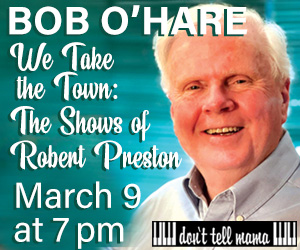Casual notes on show biz books, memoirs, and studies, dust gatherers and hot off the presses.
Jeffrey Seller, Theater Kid: A Broadway Memoir (New York: Simon and Schuster, 2025). 355pp.
51st edition
As readers of this column know, I’ve reported here on many fine entertainment world memoirs, but none are as compulsively readable as a new one by Jeffrey Seller called Theater Kid: A Broadway Memoir. Jeffrey Seller, you ask? It’s certainly not a household theatrical name, at least among those who aren’t devotees of the world of “business” as modified by “show.”
But if I tell you that Jeffrey Seller grew up a poor Jewish boy from Michigan who became am unusually successful producer of hit Broadway musicals, your eyes should open and, if someone’s reading this to you, your ears prick up. I mean, this is a guy with a track record that began, spectacularly, with Rent, and moved on to Avenue Q, In the Heights, and Hamilton, each a hit, with a total of 22 Tony Awards (four for Best Musical!); amazingly, two of them even won Pulitzers. His artistic and financial achievements over the past three decades may have made him one of Broadway’s biggest machers, but he has every reason to be as proud of his book as of his stage productions.

Seller, born in 1964, holds your attention tightly by telling his story in the present tense, a device that, combined with the sincerity and casual ease of his prose, has you following his narrative as if it’s happening while you read it. He takes his time before launching into his professional theatrical career, recounting in painfully funny terms his boyhood growing up the adopted son of a family in a suburb of Detroit, where he first began feeling an affinity for theatre in school performances.
At first his family lived in a nice middle-class section but later, when his father ran into financial difficulties, they were forced to move to a shabby area called “Cardboard Village,” an appellation that seriously shamed him. Amazingly, the house they bought there was owned by the family of Andrew Lippa, who grew up to be a successful composer-lyricist (The Wild Party), with whom Seller would eventually become both a lover and best friend, as well as a theatre-practicing schoolmate at the University of Michigan.

Seller’s descriptions of his struggling parents—particularly his oversized father, who had digestive problems that provide fuel for explosively scatological remembrances—are priceless. His depiction over the years of his love-hate-love relationship with his dad, a process server who tried to become a clown, is deeply affecting. In recalling these events, he demonstrates a gift for remembered or recreated dialogue that captures with commendable clarity things like the marital tensions between his troubled parents (divorce was often on the agenda), and his experiences in school, romance, friendship, business, marriage (with two adopted kids), and theatre.
Seller’s private life is explored with surprising frankness as he chronicles not only his discovery of being gay, but also several intensely personal homosexual encounters whose descriptive passages are so TMI they deserve trigger warnings. Readers will warm, however, to Seller’s search for his birth mother, which, late in the book, he paints in touching detail.
Seller’s depiction of his professional career begins with his work as a publicist, his job as booking agent for successful producers Fran and Barry Weisler, and his formation of a producing partnership with Kevin McCollum. Much of this is inside baseball information of great value to anyone wishing to know more about how shows get produced. The meat of his professional experience, of course, lies in his stories about producing the four shows mentioned earlier. With cameos from big shots like David Geffen and Manny Azenberg, he brings the backstage history of each show to shimmering life, displaying the insights that propelled his creative contributions, demonstrating how quality producing is much more than using financial acumen. Also explained are his breakthrough policies to provide a limited number of low-priced seats for young people to his otherwise high-priced productions.

The theatre stories are told with vivid immediacy, none more so than the circumstances surrounding the death of Jonathan Larson, who created Rent; the battle with Wicked for the Tony; and the way in which Seller and the cast of Hamilton responded to the visit of Vice-President-elect Pence shortly after he and Trump were elected. These are already legendary tales, of course, but you must read Jeffrey Seller’s accounts for the real skinny.
The sole question I have is why Seller completely avoids all the other important shows he worked on. Theater Kid may not be intended as a comprehensive account of his career, of course, but his focus on the four big shows leaves the impression that these are all he’s done in the past thirty years, overlooking his contributions to The Wild Party, a revival of West Side Story, and other significant shows. A few words on these experiences would have been helpful, even if only to remind us of the breadth of his cv; as in so many other memoirs, the lack of an index is also to be regretted.
Readers may also be disappointed by the absence of photos; the charming illustrations by Michael Byers (whose name, ridiculously, you must search for in the fine print) offer an attractive visual treat, but they’re no substitute for the kind of personal and professional images we depend on to bring books like this to life. Fortunately, Seller’s writing goes a long way to compensate, and theater kids everywhere—whatever their ambitions—will want to put his book alongside Moss Hart’s classic Act One as an example of how a kid with empty pockets, given drive, talent, and luck, can not only make it on the Great White Way, but tell about it enchantingly.
Illustrations by Michael Byers


